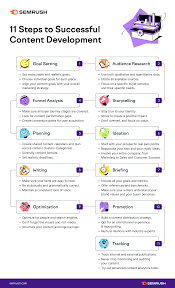
In the world of digital marketing, Search Engine Optimization (SEO) content development plays a crucial role in driving organic traffic to websites. SEO content development involves creating high-quality, relevant content that is optimized for search engines to improve a website’s visibility and ranking in search results.
Effective SEO content development requires a strategic approach that focuses on understanding the target audience, conducting keyword research, and creating valuable content that addresses their needs and interests. By incorporating relevant keywords naturally into the content, websites can attract more qualified traffic and increase their chances of ranking higher in search engine results pages.
Quality content is not only essential for engaging website visitors but also for earning backlinks from reputable websites. Backlinks are an important ranking factor in search engine algorithms and can significantly impact a website’s authority and visibility online.
Regularly updating and optimizing content based on performance metrics and user feedback is key to maintaining a strong online presence. By continually refining and improving SEO content, websites can stay competitive in ever-changing search engine algorithms and trends.
In conclusion, SEO content development is a fundamental aspect of digital marketing that can drive organic traffic, improve search engine rankings, and enhance overall online visibility. By investing in quality content that is optimized for search engines, businesses can attract more visitors, generate leads, and ultimately achieve their online marketing goals.
Researching relevant keywords to target in your content is a crucial step in effective SEO content development. By identifying and incorporating keywords that align with your target audience’s search queries, you can increase the visibility of your content in search engine results. Understanding the search intent behind these keywords allows you to create valuable and engaging content that not only attracts more organic traffic but also improves your website’s ranking. Conducting thorough keyword research is essential for optimizing your content strategy and maximizing its impact on your overall SEO efforts.
When it comes to SEO content development, a key tip is to create high-quality, engaging content that provides genuine value to readers. By focusing on producing content that is informative, relevant, and interesting, websites can attract and retain the attention of their target audience. Not only does this help improve user experience and increase engagement metrics, but it also signals to search engines that the content is valuable and worthy of higher rankings. Prioritizing quality over quantity ensures that the content resonates with readers, encourages sharing, and ultimately contributes to a successful SEO strategy.
To enhance SEO content development, it is crucial to optimize title tags and meta descriptions for search engines. Title tags are the clickable headlines displayed on search engine results pages, while meta descriptions provide a brief summary of the webpage’s content. By strategically incorporating relevant keywords and compelling language into title tags and meta descriptions, websites can improve their visibility in search results and attract more clicks from users. Optimizing these elements not only helps search engines understand the content of a webpage but also entices users to visit the site by providing a clear and enticing preview of what they can expect to find.
When it comes to SEO content development, utilizing headings and subheadings is a powerful strategy to organize your content effectively. By structuring your content with clear headings and subheadings, you not only make it easier for readers to navigate and understand your material but also help search engines better comprehend the relevance and hierarchy of your information. This practice not only enhances the user experience but also improves the overall SEO performance of your content by signaling key topics and keywords to search engine crawlers.
Including internal and external links in your SEO content development strategy is essential for enhancing both search engine optimization and credibility. Internal links help search engines understand the structure of your website and navigate between different pages, improving overall visibility and indexing. On the other hand, external links to reputable sources demonstrate credibility and authority to both search engines and users, establishing your content as a valuable resource within your industry. By incorporating a well-balanced mix of internal and external links in your content, you can boost SEO performance while building trust with your audience.
Optimizing images with descriptive filenames and alt text is a crucial tip in SEO content development. By using relevant keywords in image filenames and alt text, websites can improve their visibility in image search results and enhance overall SEO performance. Descriptive filenames and alt text not only help search engines understand the content of the images but also provide valuable context for visually impaired users who rely on screen readers. Implementing this practice ensures that images contribute positively to a website’s SEO strategy, ultimately leading to increased organic traffic and better user experience.
Ensuring that your content is mobile-friendly is a crucial tip in SEO content development to enhance the user experience. With the increasing number of users accessing websites on mobile devices, it is essential to optimize your content for smaller screens and touch interactions. By making your content responsive and easy to navigate on mobile devices, you can improve user engagement, reduce bounce rates, and ultimately boost your website’s search engine rankings. Prioritizing mobile-friendliness in your SEO content development strategy can lead to a more seamless and enjoyable browsing experience for visitors across all devices.
Regularly updating and refreshing your content is a crucial tip in SEO content development to ensure its relevance and effectiveness. By consistently revisiting and optimizing your content with new information, insights, and trends, you not only demonstrate to search engines that your website is active and valuable but also provide visitors with up-to-date and engaging material. This proactive approach not only helps improve your search engine rankings but also enhances user experience, encouraging repeat visits and increasing the likelihood of conversions.